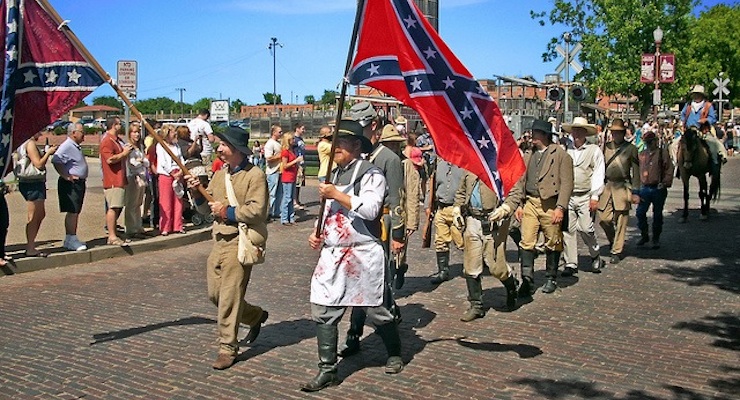

Civil War re-enactors carry Confederate flags in Forth Worth, Tex. (Photo by Steven Martin, Flickr)
In the wake of the recent murders in a South Carolina church, the killer’s hope of igniting a race war produced the opposite effect. Blacks and whites in South Carolina came together to condemn his act and the race hate behind it.
Some saw in the decision to remove the Confederate flag from in front of the state house a symbolic repudiation of the old South’s racial past — and the end of the Civil War. But, unfortunately, wars do not end until both sides decide that it is over.
The black parishioners who expressed forgiveness toward the killer did more than most of us could do, and the whites who responded with solidarity did their part. Note how quickly this was done, by ordinary people of good will — black and white — without the “help” of racial activists like Al Sharpton or Jesse Jackson.
Professional race hustlers have no incentive to see our current civil war end. They see in this shooting only an opportunity to escalate their demands.
Now there are rumblings of demands that statues of Robert E. Lee and other Southern leaders be destroyed — and if that is done, it will only lead to new demands, perhaps to destroy the Jefferson Memorial because Thomas Jefferson owned slaves. And if that is done, no doubt there will be demands that the city of Washington be renamed, for the same reason.
In short, there is no stopping point, just unending strife as far out as the eye can see. And just what will that accomplish? It could ultimately accomplish the killer’s dream of racial polarization and violence.
Neither blacks nor whites will be better off if that happens. With all the very real problems in this society, can we really spare the time and the wasted energy of trying to refight a Civil War that ended before our great-grandparents were born?
The past is irrevocable. We cannot change the smallest detail of what some people did to other people after both have gone to their graves.
Meanwhile, the old South has already changed. There is no way that the South of the mid-twentieth century would have elected a woman of Indian ancestry to be governor of South Carolina or a man of Indian ancestry to be governor of Louisiana, much less have Southern states that voted for a black President of the United States.
Perhaps the strongest evidence of the changes is that the black migrations out of the South a hundred years ago have now reversed — with younger and better educated blacks leading the new migrations from the North to the South. When people vote with their feet, that tells us a lot more than any polls.
If the past is out of our hands, what is in our hands today are the present and the future — and both have big challenges. Whatever policies or practices we consider need to be judged by their actual consequences, not by their rhetoric.
“Hate crime” laws are on some people’s agenda. But what will such laws actually accomplish? A murderer deserves the death penalty, whether he killed someone of a different race or killed his own twin brother. All that “hate crime” laws can do is provide the murderer’s lawyer with another ground on which to appeal the conviction or the sentence.
Trying to make up for the past with present-day benefits has a track record that shows many counterproductive consequences.
The federal government’s pressures against schools to not discipline so many black males is another “benefit” for blacks that is far from beneficial. It means that a handful of hoodlums in a classroom can prevent all the other black children from getting a decent education, which may be their only chance for a decent life.
Another “benefit” for blacks that turns out not to be beneficial is giving the police orders to back off during ghetto riots. Whether in Baltimore recently or in Detroit back in the 1960s, the net result has been more people killed, most of them black, and a whole community put on the downward path of physical and social deterioration.
We need a lot more serious thinking about the present and the future, and a lot less time and energy spent on the past.






